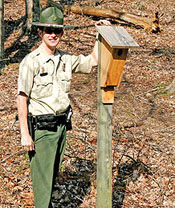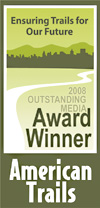
Published six times a year, The
TENNESSEE CONSERVATIONIST
is dedicated to promoting the
mission of the Tennessee
Department of Environment
and Conservation to preserve,
protect and wisely use the
state's natural and cultural
resources.
Subscriptions are $15 for one year; $22 for two years; $30 for three years.
Phil Bredesen
Governor
Jim Fyke
Environment and Conservation
Commissioner
Paul Sloan
Environment and Conservation
Deputy Commissioner
Louise Zepp
Editor
Jeff Law
Art Director/Designer
Ventrese Louise Hall
Circulation Manager
Melisa Ricard
Administrative Secretary
Mailing Address:
The Tennessee Conservationist
Dept. of Environment
& Conservation
Nashville, TN 37243-0440
(615) 532-0060

|
Ranger John Bass and one of the “Peterson” style bluebird boxes at Montgomery Bell State Park.
Photo by Kate Hargrove.
|
January - February 2009
By John Bass
As he was looking at no longer used fee stations on posts at Montgomery Bell State Park in Burns, Tennessee State Park Ranger John Bass was struck with the idea that these posts could support Eastern Bluebird nest boxes. Bass studied the idea and decided to build “Peterson” style Eastern Bluebird boxes. His idea bloomed into 13 boxes, then 17 more for a total of 30. At Montgomery Bell, by the end of the summer in 2008, there were 26 out of 30 nest boxes with Eastern Bluebirds able to fledge at least one successful brood and five of the boxes actually produced three broods. Bass writes about this project in our featured article.

|
Students gather around a campfire at the Great Smoky Mountains Institute at Tremont in Townsend.
Photo by J. Spencer.
|
Winter at Tremont
by Mary Silver
Winter in the Great Smoky Mountains National Park is a time to make connections with nature. Find our more about what winter is like for kids and families who venture outside in the elements to learn more with the Great Smoky Mountains Institute at Tremont. Writer Mary Silver, a teacher/naturalist at Tremont, in Townsend, gives the scoop on what goes on environmental-education wise when the temperatures go down. |
|
 |
|
A new, energy efficient refrigerator model with an ENERGY STAR® rating.
Photo by Louise Zepp.
|
Taming the Hog in Your Kitchen (and the Beast in Your Basement)
by Bill Avant
When is it time to replace that old refrigerator or washer and dryer with newer, more energy efficient models? Consider the options with some advice from Bill Avant, GIS/land acquisition manager for the Department of Environment and Conservation’s Recreation Education Services Division in Nashville. |
Also In This Issue:
- Connecting the Cumberlands
- Interpretation at Alvin C. York State Historic Park
- Bon Aqua Springs Resort
|
In The Next
Issue:
- River Restoration
- Butterfly Club Forms in Bristol
- Hopping Around the Cumberland Plateau
|
About The Tennessee Conservationist
The Tennessee Conservationist is an award-winning magazine recognized
around the country for beautiful photography and engaging, informative articles
about Tennessee’s natural and cultural wonders. The magazine fulfills its
purpose without receiving a state appropriation as it is totally funded
through subscription revenue, non-commercial advertising for Tennessee State
Parks and environmental programs plus gifts and donations from supporters.
Each bimonthly issue features the high quality photographs and articles
the magazine has long been best known for publishing. I
invite readers from across the nation to experience this true
Tennessee treasure.
 |
Jim Fyke
Commissioner |










